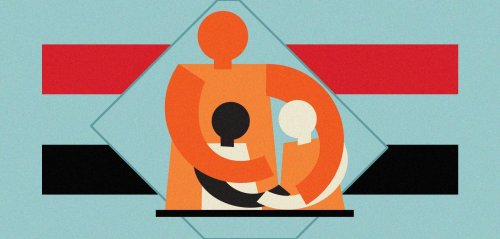Douaa (pseudonym), 26, was forced to stop taking her birth control pills after giving birth to two daughters, and not the son her father-in-law desperately wanted. Her husband was unable to stand against his parents' wishes, especially given that he lived with them. “You will be forced to face my wrath and have no place in my house if you don't deliver a boy to carry my name,” Doua’s father-in-law often told his son.
Douaa currently lives in Idlib, Syria, having been displaced from her home in the suburbs of Damascus. She lives with her four-year-old and two-year-old daughters, who she delivered via cesarean section. Throughout both her pregnancies, she suffered from bleeding, disc pain and anemia.
“I am now in my fourth month of pregnancy, and the doctor just told me that I am having a girl. I might be forced to get pregnant again within a year, in the hopes that we will conceive a boy and preserve my husband's dignity, and prevent getting kicked out of his parents’ house,” she tells Raseef22, while running her hand over her belly.
"Don't delay"
Huda, 24, gave birth to her first child at 16 years old, just a year after she was married. Although she and her husband had agreed to postpone having children for a number of reasons, including her young age and their harsh economic conditions, societal and familial pressure resulted in her gynecologist rejecting her request to use contraception before her first pregnancy.
Douaa, 26, was forced to stop birth control after giving birth to two daughters, and not the son her father-in-law so desperately wanted. “You will be forced to face my wrath and have no place in my house if you don't deliver a boy to carry my name,” Doua’s father-in-law would say.
Huda spoke with Raseef22 about her ordeal, which began barely two months after her wedding. Her mother, aunt, and neighbors visited her to congratulate her over coffee, repeating the words, “Congratulations, hopefully a boy soon. Don't you have any good news for us yet?” Huda's mother responded on her behalf, saying, “My daughter is mature, and God willing, every year she will have a boy, but it depends on her husband.” At the end of the visit, Huda’s mother instructed her to get pregnant as soon as possible, “Hurry up and carry a son. Nothing ties men to their wives like having a son does.”
Huda told her husband about the conversation with her mother and neighbors, to which he responded that his mother had told him to visit a doctor if Huda was still not pregnant after a month of trying. After this, Huda visited a gynecologist, who confirmed that she had no health problems preventing pregnancy. However, the doctor told her to bear her first child before being prescribed any form of contraception. “I gave birth to my first child, a daughter, at a very young age. During the birth, I teetered between life and death. And later, when my baby daughter cried, I would cry with her,” Huda shares.
Men refusing to use condoms
Maram Kassar, 33, a mother of three, decided with her husband to stop having children about 3 months ago. She has since struggled with choosing an appropriate method of contraception. Her husband refuses to use condoms or practice the withdrawal method, as it affects his sexual pleasure, she explains.
Despite not being ready to start a family, Huda succumbed to societal pressures and had her first child at the age of 16. Her mother used to tell her, “Hurry up and carry a son. Nothing ties a man to his wife like having a son.”
Maram had an intrauterine device (IUD) inserted at a free health center in Idlib. However, ten days after it was inserted, Kassar was forced to undergo a procedure to remove it as her uterus rejected it due to hormonal problems, which led to severe pain and intense bleeding. As a result, she began to take birth control pills, which also did not suit her body and caused a rise in blood pressure. She stopped taking them as per her doctor's advice.
Contraceptives are available at reproductive health centers across Idlib, and are often subsidized by NGOs. One of the most common methods is the IUD, which many women prefer due to its longevity and somewhat tolerable side effects including increased bleeding during menstruation and lower abdominal pain. The centers prescribe two types of birth control pills: pills containing only progesterone, and combination pills containing both progesterone and estrogen. In addition, they offer progesterone injections. The only method of contraception offered to men at these centers in Idlib is the condom.
The World Health Organization (WHO) recognizes the following contraceptive methods: birth control pills, implants, injections, patches, vaginal rings, IUDs, condoms, male and female sterilization, the withdrawal method and tracking the female cycle. These methods vary in terms of action and effectiveness.
A study conducted by the WHO shows that two-thirds of sexually active women seeking to delay or limit pregnancy, refrain from using contraception due to fear of their side effects, health concerns, or miscalculations of the likelihood of pregnancy. As a result, a quarter of pregnancies are unintended.
Etidal believes that birth control pills can cause infertility. She shares, “I use oil, and sometimes the withdrawal method, and if I do get pregnant, whatever comes from God is a delight.” She has had no problem conceiving, having already given birth to five children. Her husband still wants more.
Grandmothers' tricks
“A cotton ball smeared with olive oil, which I insert after intercourse,” Etidal, 38, explains her chosen method of contraception. It was passed down by her grandmother, who bore nine children.
Etidal tells Raseef22 that she prefers to avoid contraceptives that might cause unwanted side effects. She believes that birth control pills can cause infertility, a widespread belief among many. She shares, “I use oil, and sometimes the withdrawal method, and if I do get pregnant, whatever comes from God is a delight.” She has had no problem conceiving, having already given birth to five children. Her husband still wants more.
On the other hand, Asmaa, 39, carefully tracks her menstrual cycle days and identifies her ovulation days with the help of a midwife. She abstains from sexual intercourse during ovulation. She says to Raseef22, “I haven't gotten pregnant for two years, and if I do, it will be God's will.”
Dr. Batoul Al Khudr, the reproductive health officer at the Idlib Health Directorate, explains that all contraceptives may have a failure rate depending on proper use, timing, and the appropriate choice of the method. She points out that the use of natural and traditional contraceptive methods increases the likelihood of pregnancy, as they are unsuccessful most of the time.
She tells Raseef22 that a significant number of women refuse entirely to use family planning methods. However, with access to good health education, the willingness to engage in methods of contraception improves. The refusal is often due to the fear of infertility or complications from contraceptives, which can all be avoided by choosing the right method for each person. Dr. Al Khudr explains, “Scientifically, there are no risks in choosing the right method for women, but due to certain prevalent beliefs in society, there is a fear and lack of interest among some.”
Elham Nisf Rattl is the supervisor of the reproductive health center affiliated with the SAMS organization in Idlib province. She tells Raseef22 that the center receives about 75 visitors per day. They provide simple and compound birth control pills, copper IUDs, progesterone injections, and condoms. Some women rely on traditional contraceptive methods such as breastfeeding and the withdrawal method.
"I gave birth to my first child at a very young age, at 16. When my baby daughter would cry, I would cry with her."
According to her, society and the local community, with their many customs and traditions, significantly influence the use of contraceptive methods. Prevalent beliefs regarding the religious legitimacy of using these methods and limiting the number of children influence women in their decision to use contraception. Some believe that having many children brings livelihood, and that multiple, consecutive pregnancies will eventually result in the birth of a baby boy. She notes that most abortions occur in women under the age of 18 or in those over 40.
Doctors Without Borders in Idlib
Zubaida Abdo, the director of reproductive health activities at Doctors Without Borders (MSF–Médecins Sans Frontières) in Idlib, tells Raseef22 that the organization, through health facilities it supports or manages in northwest Syria, provides reproductive health services for mothers. It educates women on family planning methods, and helps them choose the most suitable method while ensuring their independence and privacy.
These services include prenatal health care for mothers and fetuses through regular check-ups, gynecological consultations, natural childbirth, and cesarean sections when needed, as well as family planning services. Abdo points out that family planning and birth spacing services are essential health services for mothers that reduce disease rates and deaths, and improve economic and social well-being.
Better access to family planning methods not only benefits women's health but can also positively impact the health of the entire family. This is achieved through the mother's ability to provide comprehensive care for children up to at least two years old, her ability to breastfeed naturally and teach children healthy habits and behaviors. Access to maternal and family health care in low and middle-income countries, in addition to suitable family planning methods, also leads to a reduction in unwanted pregnancies and unsafe abortions.
Women's response to reproductive health services is influenced by several factors and varies from one society to another. There are stigmas surrounding reproductive health services and the discussion of reproductive health.
Women's response to reproductive health services is influenced by several factors and varies from one society to another. There are stigmas surrounding reproductive health services and the discussion of reproductive health.
Births in Idlib
Local authorities do not provide comprehensive statistics on the numbers of births or abortions in Idlib. Raseef22 obtained several statistics from maternity hospitals or reproductive health centers supported by NGOs, which showed an increase in the birth rate in 2023, to nearly 60,000 births.
The Reproductive Health Center at the Idlib Health Directorate documented 44,228 births, and the maternal health care services provided by Doctors Without Borders (MSF) in northwest Syria documented 14,000 births. This includes 3,200 cases that required a cesarean section. The monthly average of births was 433, which include 127 cesarean sections, and 30 miscarriages, as documented by the maternity hospital in Idlib and supported by the American organization SAMS.
Raseef22 is a not for profit entity. Our focus is on quality journalism. Every contribution to the NasRaseef membership goes directly towards journalism production. We stand independent, not accepting corporate sponsorships, sponsored content or political funding.
Support our mission to keep Raseef22 available to all readers by clicking here!
Interested in writing with us? Check our pitch process here!







